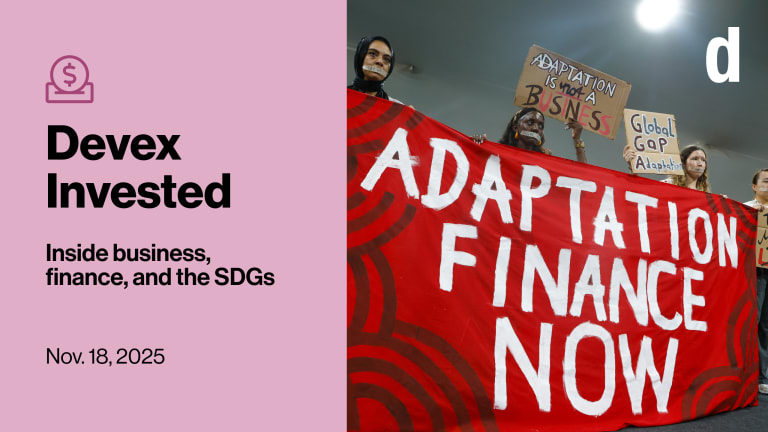Devex Newswire: In 2022, crypto-philanthropy imploded — or did it?

Twelve months ago, things were looking rosy for crypto philanthropy. Now, not so much. We take a look at the situation — and why some are still optimistic despite the headlines.
Also in today’s edition: While COP 27 may have quickly fallen out of the headlines in favor of the World Cup, we have an inside look at the one standout breakthrough of the Sharm el-Sheikh jamboree: The “loss and damage” fund.
Tales from the crypto
It’s almost Christmas (I can’t believe it myself), and as the cold weather here sets in, my colleague Stephanie Beasley took a hard look at crypto donations. The expected boom year, she says, was actually a bit of a bust.
Over the last 12 months, cryptocurrencies have reportedly lost more than $1.4 trillion in value (let’s put aside for now who gave them a sky-high valuation in the first place). The collapse of Sam Bankman-Fried’s FTX and the attendant cascading fallout has only accelerated that downward spiral. In other words, now is the winter of our crypto cents.
If that feels like a bit of coal in your virtual stocking, not everyone is ready to throw in the towel just yet.
“I’m cautiously optimistic,” says Ben Simon, a director at Crypto for Charity. At least as long as no one decides to throw a “nuke” in the digital market, he adds.
This is a preview of Newswire
Sign up to this newsletter for an inside look at the biggest stories in global development, in your inbox daily.
Michael Jones, an associate professor of economics at the University of Cincinnati, tells Stephanie that nonprofits need to step up their due diligence on donors. SBF, for example, was a massive donor and is intricately linked to the so-called effective altruism movement.
Law enforcement could seek to claw back donations SBF made, Jones warns, but noted that “This is not a new issue.” The opioid epidemic recently left charities scrambling to deal with donations from the Sackler family, which in March agreed to pay $6 billion as part of a settlement with those who accused the family of furthering the opioid crisis.
Read more: Has 2022 been a bust for crypto philanthropy? (Pro)
+ Not a Devex Pro member yet? Start your 15-day free trial today to unlock the piece.
Loss and damage control
The pledge high-income nations made to provide $100 billion annually in climate finance is years behind schedule, leaving desperate countries hard-hit by climate change skeptical the money will ever come through.
In Egypt, though, the world agreed on the new loss and damage fund — a form of climate reparations — which my colleague William Worley tells me is not at all simple, even as it has grand ambitions. So what is going to happen?
“You can’t agree on establishing an institution and all that entails in just two weeks,” Harjeet Singh of the Climate Action Network International tells Will, urging some patience. A huge concern is making the fund accessible, unlike existing global climate mechanisms which are cumbersome for nations seeking capital.
Alden Meyer, a senior associate at the think tank E3G, noted that a key unknown going ahead is, of course, funding. Western nations want China and Middle East petro-states to contribute. “It's going to be a huge fight, not just on loss and damage but on broader climate finance going forwards,” says Mayer.
DevExplains: Why COP 27's loss and damage fund is the new battleground (Pro)
Want to get in on this? Our careers team is seeing a wide array of opportunities for those working at the cross section of climate and development. We analyzed upwards of 200 full-time staff positions posted on Devex’s jobs board. It’s all part of our ongoing effort to highlight salary trends across the development sector.
You’ll find some surprises here, and maybe some leads.
Learn more: What we know about globaldev salaries for climate roles (Career)
+ Get 75% off — that’s $2.40 a month — an annual Devex Career Account membership. A membership gives you access to our latest events and career guides, plus over 6,000 exclusive job postings. Promo ends today.
Words of experience
“I come from what they would call a ‘vulnerable community,’ and I can tell you that we are already adapting to the climate crisis — because we are living it every day.”
— Kennedy Odede, CEO, Shining Hope for CommunitiesIn an op-ed for Devex, Odede touts the loss and damage fund as one of COP 27’s heartening moments — but notes that “there are still a lot of unknowns about how the fund will work and no guarantee we’ll actually see money flowing to local organizations.”
Opinion: COP 27 left out Africans, but climate progress still possible
Banking on reform
There is real momentum afoot for reforming the multilateral development banks so they can lend more money to lower- and middle-income countries. With a December deadline for the World Bank to submit to the U.S. Treasury its first road map for operational changes, philanthropies are trying to catalyze ideas.
The MDB challenge fund, which has $5.25 million available, is calling for proposals. The first deadline is Dec. 16 for “innovative solutions” to the financing challenges. Stephanie and I wrote about the philanthropies setting up this fund during the bank’s annual meeting last month.
DAC tales
Everyone’s watching Denmark versus Norway today. Not a football game, but the race to chair the OECD Development Assistance Committee — the body that sets the rules on what counts as official development assistance.
The 31 DAC members have until 6 p.m. CET to choose between Nikolai Astrup, a 44-year-old ex-development minister from Norway’s Conservative Party, and Carsten Staur, the 68-year-old former head of Danish development agency Danida and the country’s representative to OECD.
Denmark is an EU member state but Norway isn’t. The EU itself is the only nonstate DAC member, but it likely won’t be putting its finger on the scales. “We trust that the final decision will be fully governed by the merits and the programme and interviews of candidates," a commission spokesperson tells us.
Read the candidates’ programs here, and we’ll have the results for you in the next Newswire.
ICYMI: The three-man race to replace Moorehead as DAC chair
In other news
The Coalition for Epidemic Preparedness Innovations has released its plan to develop future vaccines in 100 days. [Financial Times]
A landmark malaria vaccination drive has started in Malawi, which aims to immunize all children under 5, even in the country's remotest parts. [BBC]
The annual U.N. forum on internet governance started Monday with the aim of securing a digital future for all, as 2.7 billion people lack internet access. [UN News]
Sign up to Newswire for an inside look at the biggest stories in global development.
Search for articles
Most Read
- 1
- 2
- 3
- 4
- 5








